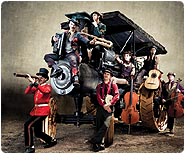|
|
 |
 The Opera Electric:
The Opera Electric:
Vagabond Opera Brings High Drama Cabaret-Close on Sing For Your Lives! and on Tour, September and October 2011
It’s a dark and stormy night. The cabaret swirls smoke, euphoria, danger. A burlesque beauty sings a swooping, eerie song and suddenly sprouts a full beard. An itinerant tenor and a melancholic balloonist croon to apocalyptic waltzers. The drums ba-da-boom, the cellos duel, the gitarrón’s been drinking.
It’s Vagabond Opera—you’d better Sing for Your Lives! (release: September 13, 2011)!
Like surrealist Marcel Duchamp packing an entire life’s work into a suitcase, the Portland, Oregon troupe tucks the high drama of opera into the tight squeeze of the sexy cabaret. By turns sinister and seedy, sweet and nostalgic, the brainy, sultry band mashes up Eastern European folk theater and classical grandeur, hot club act and avant-garde klezmer jams, perky musicals and edgy absurdism.
“We love storytelling, creating a world on stage or on a recording,” says saxophonist and songwriter Robin Jackson. “We bring people into a dark cabaret where they forget themselves.” “We draw on Old World elements and genres,” adds Eric Stern, Vagabond Opera founder, composer, and singer, “but we utterly transform them.”
The band take the polychrome pleasures of their musical, theatrical storytelling on the road in September and October, including performances in Berkeley, Chicago, Seattle, St. Louis, and Vancouver.
***
What’s a tenor to do?
Stern adored opera—he used to blast his tape of “The Marriage of Figaro” for his fellow teens in pre-rock show parking lots. He loved opera so much, he had to break it out of its elitist ghetto. Opera was once an art form ordinary people enjoyed, he reasoned, and it was time to take it back to those roots.
“I remember looking around the audience at a Ziggy Marley concert and thinking, ‘Why does opera have to be in an opera house, someplace that seems inaccessible to so many?’” Stern remembers. “Why can’t these people listen to opera in this venue? I wanted to snatch this art and distribute it everywhere.”
Searching for a new approach, Stern found himself omnivorously devouring everything from Hendrix guitar licks and Janice Joplin’s gritty wails, to Romanian horas and Yiddish theater music. “While I love the Western European music traditions, I saw no reason why you can’t incorporate other traditions into opera as well,” Stern reflects. “I’m Jewish and wanted more Eastern European sounds in play, things I wasn’t hearing enough of in classical music.”
So Stern set aside the high-stakes auditions and the high-powered classical circles. He hitchhiked to the Rainbow Gathering to hang in a totally different world. He wandered up and down the West Coast, playing his beloved pawn shop accordion on street corners and belting arias. He fell in with kindred spirits like Jackson in Portland’s erudite, freak-friendly art scene.
Along with Jackson—a trained ethnomusicologist, brooding free spirit, and lifelong addict of musicals—the troupe embraced a former Cirque de Soleil vocalist and carny-loving cellist native to Poland (Ashia Grzesik); a classically trained cello virtuoso with a penchant for avant improv (Skip vonKuske); an Afro-Brazilian percussion ace and jazz drummer (Mark Burdon); a Balkanologist bassist who digs black metal and traditional Mexican gitarrón (Jason Flores); and the mysterious Dr. Xander Gerrymander, a mayhem-inducing jack-of-all-trades whose wild dancing at an outdoor show so impressed the group, he was dubbed “King of the Gypsies.”
“When we first started,” Jackson recalls with a smile, “the band was a strange sort of folk ensemble, with Tom Waits and belly dance thrown in. We did a lot more klezmer at the time”—roots they still honor with songs like “Tough Mazel.” “That naturally led to gypsy brass and Turkish music. It all works together, even though it comes from different roots.”
From these similar yet diverse sources spring striking originals: a fado-laced ballad of a cursed night in a shadowy foreign town (“Coimbra”); the bittersweet tale of a heartbroken balloon expedition (“Red Balloon”), told in a tango; and hip-swinging Eastern European exotica (“Hanumonsoon”).
Art imitates surreal life: the group steps effortlessly from odd meters and vamps worthy of a Transylvanian wedding, to odd-ball skits in wild costumes harkening back to Weimar and the Roaring Twenties. They can channel Kurt Weil and Django Reinhardt, as sensual fire-dancers gyrate or hairstyling waiters hilariously turn Grzesik into a bearded lady (“Beard and Moustache”). They make the pomp of opera shimmy, by turns grave and goofy.
Vagabond Opera bust open the walls of tradition by carrying it to street corners, cabarets, and clubs. “We’ve always asked, ‘Why not work in this beautiful medium, opera, but surround it with all these unexpected instruments and sights and stories?’” Stern says. “We take this big, ambitious art form and distill it. We make it portable.”
<< release: 09/13/11 >>
|
|
 |
|
|
|